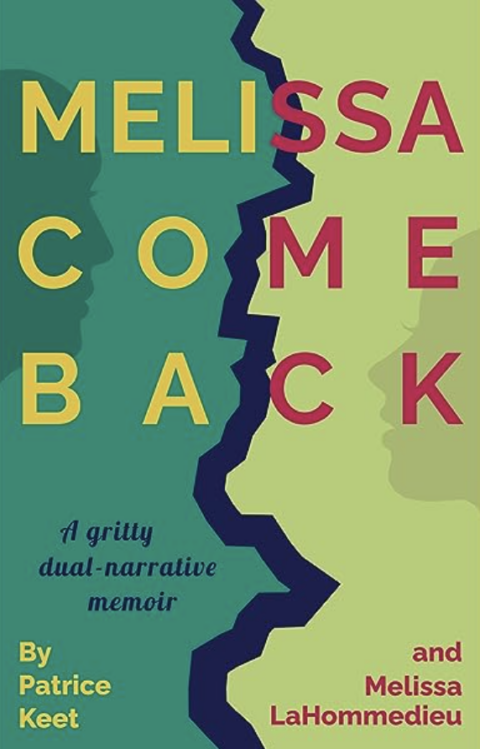Above: Melissa LaHommedieu (right) and her foster mom Patrice Keet (left) commemorate the publishing of their book. (Photo by Brenda Peaden)
Melissa LaHommedieu is a dedicated and highly empathic social worker for the county of Santa Cruz, specializing in matching individuals and families with stable housing. She also serves on the board of CASA (Court Appointed Special Advocates), helping foster youth.
These are both perfect roles for LaHommedieu, because she has deep familiarity with the subjects.
Child Protective Services removed LaHommedieu from her biological family at age 7 1/2, after years of horrific abuse by her stepfather. At 9, she went to live as a foster child with Santa Cruz residents Bob and Patrice Keet, who encouraged her academically and taught her to read.
 Despite best intentions and genuine love and effort on both sides, life at the Keet home grew increasingly strained. LaHommedieu desperately missed her brother, mother, and younger sisters. One morning, at age 11, she filled her backpack with clothing and seemed to set off for school on her purple bicycle with a banana seat and streamers; instead, she turned onto the freeway on-ramp, trying to ride her bike to her grandmother’s house about 25 miles away, using the only route she knew. The police picked her up, and LaHommedieu moved into a group home and then into a series of highly toxic and abusive situations and environments. But LaHommedieu and the Keets never forgot each other.
Despite best intentions and genuine love and effort on both sides, life at the Keet home grew increasingly strained. LaHommedieu desperately missed her brother, mother, and younger sisters. One morning, at age 11, she filled her backpack with clothing and seemed to set off for school on her purple bicycle with a banana seat and streamers; instead, she turned onto the freeway on-ramp, trying to ride her bike to her grandmother’s house about 25 miles away, using the only route she knew. The police picked her up, and LaHommedieu moved into a group home and then into a series of highly toxic and abusive situations and environments. But LaHommedieu and the Keets never forgot each other.
In 2014, LaHommedieu was invited to give a keynote speech at a CASA event. Speaking through tears about life as a former foster youth—including abuse, domestic violence, homelessness, drug use, and poverty—she never suspected that the Keets were in the audience, shocked to realize that the keynote speaker before them was their long-lost foster daughter who had run away about 20 years earlier.
The Keets subsequently invited LaHommedieu and her daughters—who faced imminent homelessness—to share their home. This serendipitous turn of events empowered LaHommedieu to break the cycle of poverty and abuse that she had been born into and pursue her dream of higher education. LaHommedieu transferred to UCSC in 2017. Two years later, she became the first in her biological family to earn a college degree.
Stepping into the academic world of UCSC felt exciting and often anxiety-provoking, since many foster youth and students from nontraditional environments don’t come to college with the fundamental skills and knowledge most students take for granted. LaHommedieu credits UCSC’s Smith Society, which provides academic, social, financial, and personal support to students lacking traditional family support, as critically important. Supportive and influential instructors like psychology lecturer Kim Cardilla (College Nine ’03; M.S. ’05; Ph.D. ’08, psychology) also made a positive difference.
“I had a really profound learning experience in [Cardilla’s] developmental psychology course,” LaHommedieu said.
LaHommedieu’s experience as a foster youth was very lonely.
LaHommedieu strongly believes that prospective foster parents would benefit from a mentorship experience with existing foster parents.
“I don’t know if that exists,” she said. “But maybe that would be my next endeavor.”
Melissa LaHommedieu’s full story is available in her book, Melissa Come Back: A Gritty Dual-Narrative Memoir, co-written with Patrice Keet.

